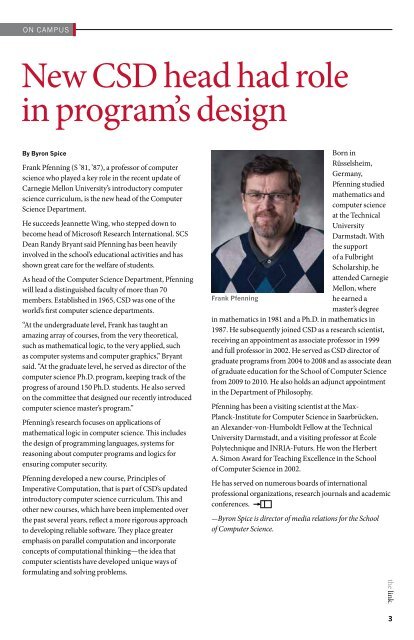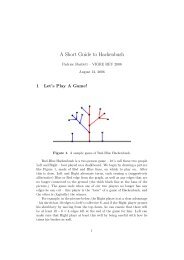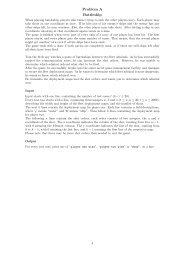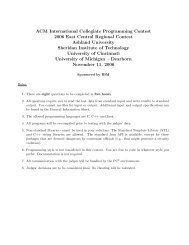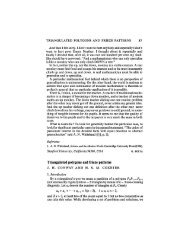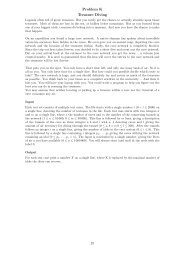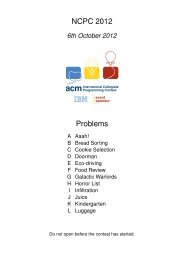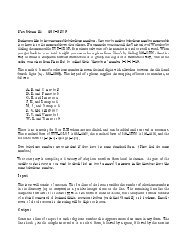Download now (1.3MB, PDF reader required) - Link home page
Download now (1.3MB, PDF reader required) - Link home page
Download now (1.3MB, PDF reader required) - Link home page
You also want an ePaper? Increase the reach of your titles
YUMPU automatically turns print PDFs into web optimized ePapers that Google loves.
ON CAMPUS<br />
New CSD head had role<br />
in program’s design<br />
by byron spice<br />
Frank Pfenning (S ’81, ’87), a professor of computer<br />
science who played a key role in the recent update of<br />
Carnegie Mellon University’s introductory computer<br />
science curriculum, is the new head of the Computer<br />
Science Department.<br />
He succeeds Jeannette Wing, who stepped down to<br />
become head of Microsoft Research International. SCS<br />
Dean Randy Bryant said Pfenning has been heavily<br />
involved in the school’s educational activities and has<br />
shown great care for the welfare of students.<br />
As head of the Computer Science Department, Pfenning<br />
will lead a distinguished faculty of more than 70<br />
members. Established in 1965, CSD was one of the<br />
world’s first computer science departments.<br />
“At the undergraduate level, Frank has taught an<br />
amazing array of courses, from the very theoretical,<br />
such as mathematical logic, to the very applied, such<br />
as computer systems and computer graphics,” Bryant<br />
said. “At the graduate level, he served as director of the<br />
computer science Ph.D. program, keeping track of the<br />
progress of around 150 Ph.D. students. He also served<br />
on the committee that designed our recently introduced<br />
computer science master’s program.”<br />
Pfenning’s research focuses on applications of<br />
mathematical logic in computer science. This includes<br />
the design of programming languages, systems for<br />
reasoning about computer programs and logics for<br />
ensuring computer security.<br />
Pfenning developed a new course, Principles of<br />
Imperative Computation, that is part of CSD’s updated<br />
introductory computer science curriculum. This and<br />
other new courses, which have been implemented over<br />
the past several years, reflect a more rigorous approach<br />
to developing reliable software. They place greater<br />
emphasis on parallel computation and incorporate<br />
concepts of computational thinking—the idea that<br />
computer scientists have developed unique ways of<br />
formulating and solving problems.<br />
Born in<br />
Rüsselsheim,<br />
Germany,<br />
Pfenning studied<br />
mathematics and<br />
computer science<br />
at the Technical<br />
University<br />
Darmstadt. With<br />
the support<br />
of a Fulbright<br />
Scholarship, he<br />
attended Carnegie<br />
Mellon, where<br />
frank pfenning<br />
he earned a<br />
master’s degree<br />
in mathematics in 1981 and a Ph.D. in mathematics in<br />
1987. He subsequently joined CSD as a research scientist,<br />
receiving an appointment as associate professor in 1999<br />
and full professor in 2002. He served as CSD director of<br />
graduate programs from 2004 to 2008 and as associate dean<br />
of graduate education for the School of Computer Science<br />
from 2009 to 2010. He also holds an adjunct appointment<br />
in the Department of Philosophy.<br />
Pfenning has been a visiting scientist at the Max-<br />
Planck-Institute for Computer Science in Saarbrücken,<br />
an Alexander-von-Humboldt Fellow at the Technical<br />
University Darmstadt, and a visiting professor at École<br />
Polytechnique and INRIA-Futurs. He won the Herbert<br />
A. Simon Award for Teaching Excellence in the School<br />
of Computer Science in 2002.<br />
He has served on numerous boards of international<br />
professional organizations, research journals and academic<br />
conferences.<br />
—Byron Spice is director of media relations for the School<br />
of Computer Science.<br />
the link.<br />
3


